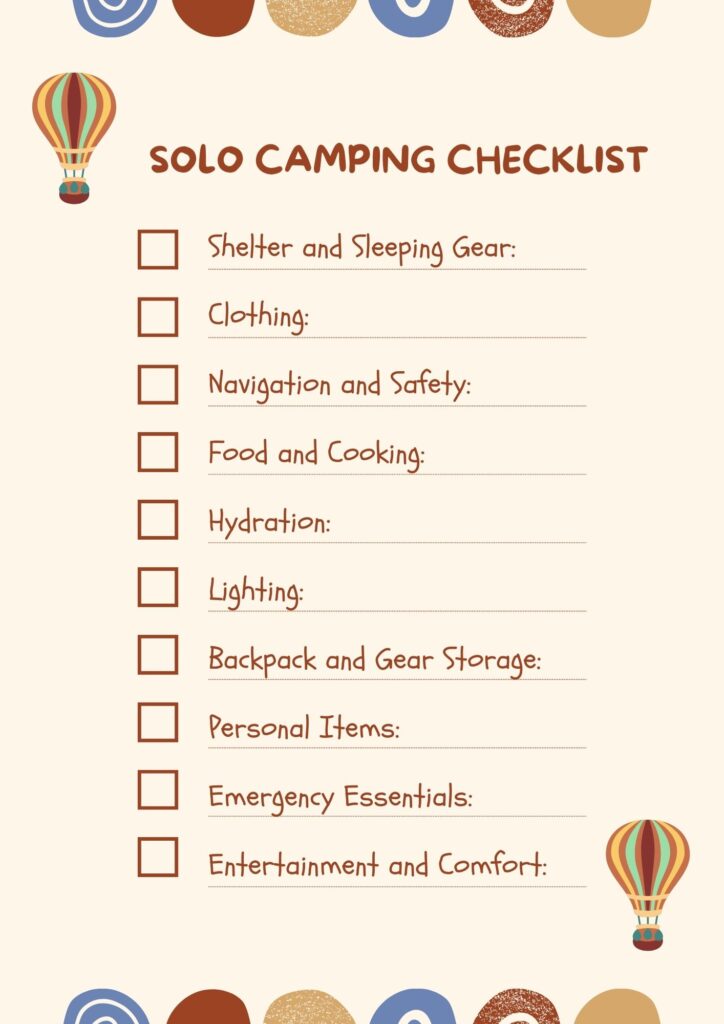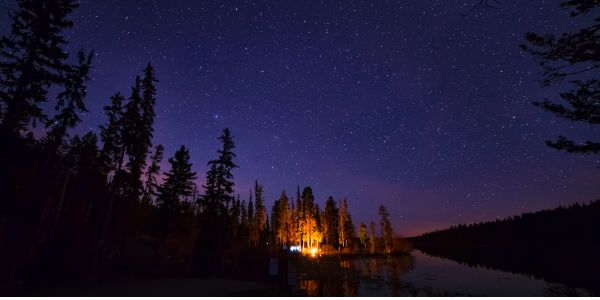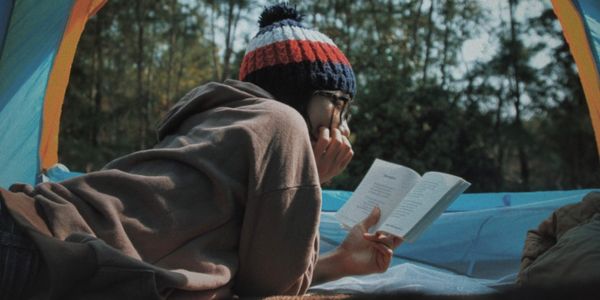Solo tent camping offers a unique and rewarding experience for those seeking solitude and a deeper connection with nature. Whether you’re an experienced solo camper or considering embarking on your first solo adventure.
This comprehensive guide will walk you through the essentials of solo tent camping, from choosing the right gear to ensuring a safe and enjoyable solo outdoor experience.
Is solo Tent Camping fun and safe?
AbsolutelyYes! Solo tent camping can be a blast and quite safe with the right preparation.
Just you, the great outdoors, and the soothing sounds of nature. It’s like a solo adventure where you get to set the pace and call all the shots.
Now, safety first, my friend. Make sure to choose a well-traveled and safe camping spot, let someone know your plans, and pack essentials like a first aid kit, proper clothing, and enough snacks to keep you fueled.
As long as you’re mindful of your surroundings and follow basic camping guidelines
THE BENEFITS OF SOLO CAMPING
Here are some explained benefits of solo camping:
- Self-Reliance and Independence: Solo camping throws you into the deep end of self-reliance. You’re the one pitching the tent, building the fire, and figuring out how to navigate the terrain. It’s a crash course in independence, teaching you to trust your instincts and skills.
- Uninterrupted Reflection: Without the usual noise of everyday life, solo camping offers a peaceful environment for self-reflection. You can disconnect from technology, social media, and the constant buzz of notifications, giving your mind the space it needs to unwind.
- Personalized Adventure: When you’re solo camping, the itinerary is all yours. You decide when to hike when to relax, and when to just soak in the beauty of nature. It’s a customized adventure tailored to your preferences and pace.
- Escape from Distractions: Being alone in nature allows you to escape the distractions of modern life. It’s a chance to detox from the constant stimuli, providing a mental break and allowing you to fully appreciate the beauty and simplicity of the natural world.
- Connection with Nature: Solo camping provides a unique opportunity to connect with nature on a deeper level. Without the distractions of companionship, you may find yourself more attuned to the sights, sounds, and sensations of the natural environment.
- Personal Growth: Solo camping often pushes you out of your comfort zone, fostering personal growth. Facing and overcoming challenges alone can lead to a stronger sense of resilience, adaptability, and a better understanding of yourself.
SOLO CAMPING CHECKLIST

- Shelter and Sleeping Gear:
- Tent (with stakes and guylines)
- Sleeping bag suitable for the expected temperature
- Sleeping pad for insulation and comfort
- Clothing:
- Weather-appropriate clothing (layers are key)
- Waterproof jacket and pants
- Hat for sun protection or warmth
- Sturdy hiking boots or shoes
- Navigation and Safety:
- Map and compass (and know how to use them)
- Fully charged GPS device or smartphone with offline maps
- Multi-tool or knife
- First aid kit
- Food and Cooking:
- Portable stove or cooking system
- Lightweight cookware and utensils
- Ready-to-eat meals or ingredients for simple cooking
- Water filter or purification tablets
- Hydration:
- Sufficient water bottles or hydration system
- Water purification method (filter, tablets, or purifier)
- Lighting:
- Headlamp or flashlight with extra batteries
- Camping lantern for ambient light at the campsite
- Backpack and Gear Storage:
- Comfortable backpack with proper fit
- Dry bags or waterproof pouches for important items
- Compression sacks to optimize space
- Personal Items:
- Identification and any necessary permits
- Cash for emergencies
- Personal hygiene items (toothbrush, toothpaste, etc.)
- Quick-drying towel
- Emergency Essentials:
- Whistle
- Signal mirror
- Firestarter (waterproof matches or lighter)
- Entertainment and Comfort:
- Book or journal
- Camera or smartphone for capturing memories
- Lightweight camp chair or sitting pad
Read More: How Long Does A Camping Propane Tank Last
HOW TO CHOOSE A CAMPSITE

Picking the perfect campsite is Quite Difficult but First off, consider your camping style. Are you a nature buff who craves solitude, or do you thrive amid a buzzing campground?
Once you’ve got that sorted, think about the terrain. If you’re all about those mountain views, go for higher ground, but if you’re a water baby, a lakeside spot might be your jam. Keep an eye out for nearby amenities too
whether you’re a glamper or a minimalist, having a restroom nearby can be a game-changer. And don’t forget the weather forecast! Nobody wants a surprise rain shower crashing their camping party.
Safety Tips for Solo Tent Camping

First and foremost, let someone know your plans. Inform a friend, family member, or even a neighbor about your solo camping trip, including your planned route, expected return date, and any emergency contacts. This precautionary measure ensures that someone is aware of your whereabouts, providing an extra layer of safety in case the unexpected occurs.
Second, prioritize safety by choosing a well-traveled and beginner-friendly camping spot. Opt for established campsites where help is more accessible if needed. Familiarize yourself with the area’s regulations, potential hazards, and emergency procedures. A little preparation goes a long way in creating a secure camping environment.
Third, practice setting up your tent before you hit the wilderness. Knowing what type of tent and how to pitch your tent efficiently can save you time and frustration on-site. You can also use tent insulation if you are going on a cold and freezing camping trip. Additionally, it boosts your confidence, making you feel more at ease in your temporary outdoor home.
Fourth, pack strategically. Focus on essentials like a first aid kit, proper clothing for varying weather conditions, sufficient food and water, and a reliable navigation tool. Being well-prepared ensures that you can handle unexpected challenges and enjoy your solo adventure to the fullest.
Lastly, embrace the solitude and disconnect from the digital world. Solo camping offers a unique opportunity for self-reflection and connection with nature. Leave the screens behind, immerse yourself in the natural surroundings, and savor the serenity that comes with being alone in the great outdoors. With these tips in mind, you’re well on your way to a rewarding and memorable first-time solo camping experience
WHAT TO DO BEFORE YOU GO
The pre-camping ritual! First things first, make a checklist. It’s your battle plan against forgotten essentials. Double-check your gear — tent, sleeping bag, stove, the whole shebang. Test those flashlight batteries, too. Nobody wants a lights-out situation in the middle of the woods. Plan your meals and pack accordingly, because let’s be real, gourmet camping food is a thing.
Inform a friend or family member about your whereabouts, just in case you decide to go off the grid. And don’t be that person who forgets the first aid kit—it’s your camping superhero cape. Lastly, familiarize yourself with the campsite rules. Knowing the lay of the land keeps you in everyone’s good graces.
Now, with your checklist conquered and gear in tow, you’re ready to embrace the great outdoors!
WHAT TO DO IF YOU GET SCARED AT NIGHT

Ah, the spooky night scenario! It happens to the best of us. If the dark starts playing tricks on your imagination, first things first—take a deep breath.
Remember, you’re the boss of this camping trip. Next, cozy up in your sleeping bag like a burrito and turn on a comforting light source. A trusty lantern or even your flashlight will do the trick. Familiarize yourself with the sounds around you; nature’s nocturnal orchestra can be surprisingly soothing once you know it’s just the wind or a curious critter.
If you’re feeling a bit more adventurous, stargazing can be a fantastic distraction. Nothing like a celestial light show to put those nighttime fears in their place. And hey, if all else fails, there’s no shame in having a camping buddy to share spooky stories and laughter with. After all, it’s just you, the wilderness, and a whole lot of imagination. Sweet dreams!
THINGS TO DO WHILE CAMPING ALONE

Solo camping is a fantastic opportunity to indulge in some “me time” and connect with nature personally. Here’s a list of things you can do while camping alone:
- Nature Observation: Take the time to observe the flora and fauna around you. Appreciating the natural world can be incredibly fulfilling, whether it’s birdsong, rustling leaves, or a squirrel’s acrobatics.
- Photography: Capture the beauty of your surroundings with a camera or smartphone. Solo camping provides a unique perspective, and you might just come away with some stunning shots.
- Reading: Bring along that book you’ve been meaning to read. There’s something magical about getting lost in a story while surrounded by the serenity of nature.
- Stargazing: Head outside your tent when the night falls and gaze up at the stars. Away from city lights, the night sky can be a mesmerizing spectacle.
- Hiking: Explore the trails around your campsite. Solo hiking allows you to set your own pace and truly immerse yourself in the landscape.
- Journaling: Document your thoughts, experiences, and reflections in a journal. It’s a therapeutic way to capture the essence of your solo adventure.
- Campfire Cooking: Experiment with campfire cooking. Whether it’s a simple meal or a gourmet treat, cooking outdoors can be a delightful solo activity. You can use firewood from the campground itself for cooking.
- Mindfulness and Meditation: Practice mindfulness or meditation to fully embrace the solitude and serenity of your surroundings. It’s a great way to recharge your mind and body.
- Sketching or Painting: If you’re artistically inclined, bring along sketching or painting materials. Create your own nature-inspired masterpiece.
- Yoga or Stretching: Take advantage of the open space and practice yoga or simple stretches. It’s a rejuvenating way to start or end your day.
What To Eat While Solo Camping

Solo camping opens up a world of culinary possibilities. Here’s a mix of practical and enjoyable food options for your solo camping adventure:
- Quick and Easy Meals:
- Instant Oatmeal: Just add hot water for a simple and filling breakfast.
- Instant Soup: A warm and easy-to-make option for lunch or dinner.
- Instant Noodles: Jazz them up with some veggies or protein for a more substantial meal.
- One-Pan Wonders:
- Foil Packet Meals: Wrap seasoned meat, veggies, and a bit of oil in foil for an easy campfire-cooked dinner.
- Skillet Dishes: Prepare simple stir-fries or one-pan meals in a compact camping skillet.
- Trail Mix and Snacks:
- Trail Mix: A mix of nuts, dried fruits, and chocolate provides a quick energy boost.
- Granola Bars: Portable and great for a mid-hike or trailside snack.
- Dehydrated Backpacking Meals:
- Pre-packaged Dehydrated Meals: These are lightweight, require minimal preparation, and come in various flavors.
- Fresh Fruits and Veggies:
- Apples, Oranges, Bananas: Durable fruits that withstand travel well.
- Carrot Sticks, Cherry Tomatoes: Crunchy and refreshing veggies for a healthy snack.
- Protein Sources:
- Canned Tuna or Chicken: Easy to pack and versatile for salads or sandwiches.
- Jerky: A protein-packed snack that doesn’t require refrigeration.
- Carbs for Energy:
- Pita Bread or Tortillas: These withstand travel better than regular bread.
- Instant Rice or Couscous: Quick to cook and serve as a base for various meals.
- Campfire Treats:
- Marshmallows, Chocolate, Graham Crackers: Classic ingredients for solo s’mores.
- Beverages:
- Tea or Coffee Bags: Enjoy a warm beverage to kickstart your morning.
- Instant Coffee Packets: For a quick caffeine fix without the fuss.
- Hydration:
- Water: Stay hydrated with sufficient water, and consider bringing electrolyte packets for added hydration.
Conclusion
Solo tent camping offers a unique opportunity for self-discovery, serenity, and a closer connection with the great outdoors. By choosing the right gear, prioritizing safety, and adhering to camping etiquette, you can embark on a solo camping adventure that is both enriching and memorable. So, gear up, embrace the solitude, and immerse yourself in the beauty of solo tent camping on your next outdoor escapade.
FAQs
Let’s tackle some FAQs for Solo Tent Camping:
Q: What kind of tent is best for solo camping?
A: A lightweight and easy-to-pitch tent is ideal for solo camping. Consider a one-person tent that balances comfort and portability.
Q: What should I do if I encounter wildlife?
A: Maintain a safe distance, don’t approach, and store food securely. Familiarize yourself with local wildlife and follow proper protocols, like making noise to alert animals to your presence.
Q: How do I stay warm at night?
A: Choose a sleeping bag suitable for the expected temperature. Dress in layers, including thermal or moisture-wicking clothing, and use a sleeping pad for insulation from the ground.
Q: What if it rains during my solo camping trip?
A: Be prepared with a waterproof rain jacket, pants, and a rain cover for your tent. Pack extra waterproof gear for your belongings and consider setting up your tent on higher ground.
Q: How do I navigate in the wilderness?
A: Bring a map and compass, and familiarize yourself with the area before setting out. A GPS device or smartphone with offline maps can also be useful, but always have a backup.
Q: What should I do in case of an emergency?
A: Carry a fully charged phone, a whistle, and a first aid kit. Know the emergency procedures for the area, and inform someone of your itinerary. In case of severe emergencies, have a plan for signaling for help.
Q: How do I overcome the fear of camping alone?
A: Start with short solo trips to familiar places. Build your confidence gradually and focus on the empowering aspects of solo camping, such as self-discovery and independence.

